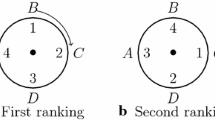Abstract
I propose a modified version of Arrow's independence of irrelevant alternatives condition (IIA). The new version preserves the most attractive feature of traditional IIA, viz., that it rules out vote-splitting in elections (in which two or more popular candidates split the vote, allowing a relatively unpopular candidate to win). Moreover, it permits election outcomes to reflect voters' preference intensities, unlike the traditional condition.
Similar content being viewed by others
Notes
Arrow insisted, for a pragmatic reason, that a SWF should determine a social ranking of alternatives rather than merely the social choice of an optimal alternative. He imagined that which alternatives in X would turn out to be feasible might not be known in advance, and so a social ranking serves as a contingency plan: if the top-ranked alternative is not available, choose the next alternative, and so on.
\( x \succ_{i} y \) means that individual i strictly prefers x to y, i.e., \( x\underset{\raise0.3em\hbox{$\smash{\scriptscriptstyle\thicksim}$}}{ \succ }_{i} y \) but \( y\underset{\raise0.3em\hbox{$\smash{\scriptscriptstyle\thicksim}$}}{\not \succ }\! {}_{i}\;x. \)
In runoff voting, there are two rounds. Each individual votes for one alternative in the first round, and if some alternative gets a majority, it is ranked first socially. If no alternative gets a majority, the top two vote-getters face each other in a runoff round, and the majority winner there is ranked first socially.
References
Arrow KJ (1950) A difficulty in the concept of social welfare. J Polit Econ 58(4):328–346
Arrow KJ (1951) Social choice and individual values, 1st edn. Wiley, New York
Arrow KJ (1963) Social choice and individual values, 2nd edn. Yale Univ. Press, New Haven
Arrow KJ (2012) Social choice and individual values, 3rd edn. Yale Univ. Press, New Haven
Gibbard A (1973) Manipulation of voting schemes: a general result. Econometrica 41(4):587–601
Maskin E (2020) The Borda Count reconsidered
Maskin E, Sen A (2016) How majority rule might have stopped Donald Trump. New York Times. Available at https://www.nytimes.com/2016/05/01/opinion/sunday/how-majority-rule-might-have-stopped-donald-trump.html. Accessed 28 Apr 2016
May KO (1952) A set of independent necessary and sufficient conditions for simple majority decisions. Econometrica 20:680–684
Satterthwaite M (1975) Strategy-proofness and arrow’s conditions: existence and correspondence theorems for voting procedures and social welfare functions. J Econ Theory 10(2):187–217
Author information
Authors and Affiliations
Corresponding author
Additional information
Publisher's Note
Springer Nature remains neutral with regard to jurisdictional claims in published maps and institutional affiliations.
This paper was prepared for a special issue of Social Choice and Welfare in memory of Kenneth Arrow. I draw on material published in my “Foreword” to the third (2012) edition of Arrow’s classic monograph Social Choice and Individual Values and on my New York Times essay with Amartya Sen “How Majority Rule Might Have Stopped Donald Trump.” I thank Amartya Sen and Kotaro Suzumura for very helpful comments on a previous version of the paper.
Rights and permissions
About this article
Cite this article
Maskin, E. A modified version of Arrow’s IIA condition. Soc Choice Welf 54, 203–209 (2020). https://doi.org/10.1007/s00355-020-01241-7
Published:
Issue Date:
DOI: https://doi.org/10.1007/s00355-020-01241-7



